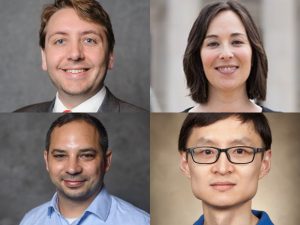
TUSCALOOSA, Ala. – Four professors at The University of Alabama this academic year received national recognition early in their careers for leading-edge research that will advance knowledge and enhance the educational experience.
Three professors were selected by the National Science Foundation for a CAREER Award, one of the nation’s most prestigious recognition of top-performing young scientists, while another was awarded the Planetary Science Early Career Award from NASA, which supports outstanding early-career planetary scientists.
The grants allow each researcher to train and motivate a new generation of scientists and engineers not only at UA through instruction and hands-on lab work, but also though outreach efforts to schools and community.
“The research supported through these awards is of national significance and brings benefits and recognition to our state,” said Dr. Russell J. Mumper, vice president for research and economic development. “This is national recognition of the top-tier research done at the University, and is indicative of the quality of the faculty we have at UA.”
An NSF CAREER Award will fund projects by Dr. Janna Fierst, assistant professor of biological sciences; Dr. Qiang Huang, assistant professor of chemical and biological engineering; and Dr. Evan Wujcik, assistant professor of chemical and biological engineering.
The NSF Faculty Early Career Development, or CAREER, Program is a Foundationwide activity offering the most prestigious awards in support of early-career faculty with the potential to serve as academic role models in research and education and to lead advances in the mission of their department or organization.
Currently, 29 UA faculty from disciplines across campus received NSF CAREER Awards during their tenure.
Dr. Alain Plattner, assistant professor of geological sciences, will receive funding from NASA’s Planetary Science Early Career Award program, one of six researchers nationwide selected.
To be considered, researchers must have received a NASA grant within the past two years and be within 10 years of earning their doctorate. This NASA program allows promising individuals to continue their work and meaningfully contribute to the planetary science community.
The NASA grant allows Plattner to broaden his work by conducting analysis of data from the NASA Galileo spacecraft flybys of Ganymede, one of Jupiter’s moons. This work aims to provide better understanding of Ganymede’s internal magnetic field, and in turn, allow insights into the internal structure of icy moons like Ganymede and Europa to be gained. Funding from this award will help Plattner build a planetary research group that serves as a pathway toward careers in the planetary sciences for talented students in the region.
Fierst will use the NSF grant to advance understanding of how genetic information can come from outside an organism’s parents by developing bioinformatics methods to isolate the process known as horizontal gene transfer. The project strives to reveal how evolutionary processes shape genomic patterns. As part of the award she will train undergraduate students in cutting-edge genomics and bioinformatics through an immersive summer research experience at UA.
Huang’s CAREER Award will explore using new electrochemical methods to fabricate superconducting materials for advanced applications such as quantum computers, medical imaging and other superconducting magnetic technology. His lab is developing new chemistry and methods to enable the manufacturing of superconducting materials, and the project should provide a fuller understanding of these methods impact on superconductivity.
For Wujcik, the NSF award funds continued experiments with an elastic material developed in his lab that conducts electricity and, more importantly, can heal itself, even if torn apart. The material is a promising advancement in the field of electronic skins, or e-skins, and wearable sensors, where scientists are working to make sensors lighter, smaller and less intrusive than currently used electronics. A provisional patent is filed to cover the chemical composition of the material.
Contact
Adam Jones, UA communications, 205-348-4328, adam.jones@ua.edu
